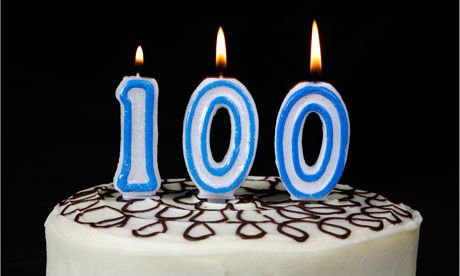
There's a scene in Friends that always makes me laugh. It's Rachel's 30th birthday and as she's recounting her life plan, she realises she should already have met her husband. It amuses me because it's exactly what I do: I make lists of things I want to do before I reach a certain age and then panic when, inevitably, I don't do them.
Last week I turned 26. As I was mulling over the things I haven't done and lamenting the fact that I'm now too old for a Young Person's Railcard, the Department for Work and Pensions published research indicating that I'm on the cusp of a generation in which more than one in four people will reach their 100th birthday. I can't speak for every British twentysomething – we're a mishmash of cultures, classes, and ideals; but an ever-increasing lifespan certainly chimes with my experience of how it feels to be young(ish) in post-millennium Britain.
Unlike my parents, who would have seen half their friends have children by the age of 25, procreation isn't necessarily a concern for the young milieu. By the same token, only 30% of us will have children by the time we're 25, and the average age for us to start a family is now 31. The result of this deferring is a sort of everlasting youth – a youth lived out in an increasingly consumer-driven society. We are continuously told that if we buy just the right combination of products and experiences, we'll be happy. At the same time, the work we undertake to pay for those products and experiences is no longer simply a means of income, but an extension of our own identity. Our careers have become something we do for the soul. As an advertising campaign for Reed Recruitment puts it, we are now expected to "Love Mondays".
A significant number of twentysomethings I know have responded to these perplexities by simply drifting along without direction. We look for fulfilment in jobs that were only ever supposed to pay the bills, engage in serial monogamy, and binge drink until we're firmly in our thirties. With bodies unsympathetic to our mental dithering, we find ourselves procrastinating at a time when nature is expecting us to bear children. Despite the promise of a centennial, time can feel like sand slipping through our fingers.
But in a way, we're lucky to have such trifling concerns. The son of a less hesitant twentysomething friend can expect to live in a much harsher climate. He's already been denied education maintenance allowance, and if he does go to university, he will leave chained to gargantuan levels of debt. As he gets older, he'll be faced with a narrowing job market, an inflated housing market, a precarious health service, and may have a meagre pension to retire on. In a society such as this, living a hundred years seems – to use a Cleggism – a "miserable little compromise".
In any case, we shouldn't assume that we all have an equal chance of reaching triple figures. It's no coincidence that Monaco, tax haven for the rich, currently boasts the longest life-expectancy in the world. Conversely, male life expectancy in Calton, Scotland, is 54 – nearly 36 years lower than Monaco, and 16 years lower than a man living in the Gaza strip. Indeed, Calton is worlds away from Monaco: 44% of its population are on incapacity benefit, while 37% live in workless households. As one of the most deprived areas in the country, it's not just length, but quality of life that Calton lacks.
In the end, quality of life – the missing issue in reports of life expectancy – is what really matters. Celebrating your 100th birthday is a pleasant prospect if the years that precede it are fulfilling and happy. But the economic situation my generation faces threaten such quality of life.
Perhaps we should take such signs of an ageing population as a cue to ensure that, if we're going to be here for a century, it is at least a happy one – whether we choose to spend our lives in the sumptuousness of Monaco, or the east end of Glasgow.
• This article was amended on 20 April 2011. It originally concluded with the words "or a little town in Scotland", referring back to Calton. In fact, Calton is a district of Glasgow. This has now been corrected

